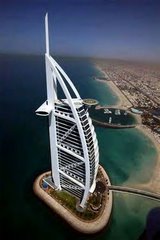Dubai has a total area of approximately 2,428 sq miles. The seven independent emirates are: Abu Dhabi , Dubai , Sharjah, Ajman, Ras Al Khaimah, Umm Al Quwain and Fujairah. They came together to form the United Arab Emirates (UAE) in the year 1971. While Abu Dhabi is the capital city of the UAE, Dubai is unquestionably the commercial, leisure, shopping and sporting capital of the Gulf.
 Language
LanguageArabic is the national language of the United Arab Emirates and Dubai, but English is often used in business. Hindi, Urdu and Farsi are also widely spoken. Dubai now has a population made up of more than 70 nationalities.
Economy
The UAE is one of the world's wealthiest countries, with a GDP of US $54 billion (2000), and has the third-largest proven oil reserves in the world. While oil and gas production form its foundation, Dubai is increasingly broadening its economic activity to include: real estate, tourism, trading and manufacturing.
Airport
Dubai International Airport , is a total 4 kms from the city centre.
Metered taxis are readily available at the airport. Most hotels operate courtesy coaches or limousines for guests with confirmed reservations. Emirates also offers its own complimentary chauffeur-driven car service, for full fare Business or First Class passengers.
Customs
Visitors of Dubai and United Arab Emirates may import 2,000 cigarettes or 400 cigars or 2 kgs of tobacco and 150g of perfume. Only Non-Muslims can import 2 litres of spirits or 2 bottles of wine.
Currency
The UAE Dirham (AED) is divided into 100 fils. Notes are issued in denominations of 5, 10, 20, 50, 100, 200, and 500 Dirhams; coins in 5, 10, 25 and 50 fils and 1 Dirham. Foreign currency and travellers cheques can be converted at all banks and hotels. International credit cards are accepted just about everywhere except at a few shops in the souks, however to prevent creditcard fraud we suggest to use cash whereever possible. There are no currency import or export restrictions.
Clothing
It is usual to wear a suit and tie when conducting business in Dubai. Otherwise dress is generally informal, although ladies should avoid wearing low-cut dresses or shorts in public places out of respect for local religion and customs. Regular swimwear is acceptable around hotel pools and on beaches.
Yearly Climate
Dubai enjoys 365 days of warm sunshine, with cooler evenings and occasional showers in the months between November to March.
The UAE has a sub-tropical, arid climate with infrequent and irregular rainfall, amounting to less than 13 centimetres a year. Temperatures range from a low of 10 degrees (Celsius) to a high of 48 + degrees. The average daily maximum is 24 degrees in January, rising to 42 degrees in July.
Getting around
Taxis
Three companies operate metered taxis in Dubai and they are easy to find on the street - Dubai Transport Corporation recognisable by their cream cars, National Taxis with silver cars and Cars Taxi with white and a blue/red stripe on their cars. The fares of non-metered taxis are negotiated between driver and passenger, starting at a minimum of around Dhs10 for short local journeys, while Dhs20 to Dhs30 is the rule of thumb if you cross the Creek from one side of the city to the other. Dubai Transport taxis also operate a service from the airport. The pick-up fee is Dhs16 and the fare then accrues at Dhs1.17 per kilometre.
Car-hire
Self-drive cars are available from car rental companies for visitors who have an international driving licence. Renters must produce their passport along with a valid licence. Visitors without an international driving licence may obtain a temporary local driving licence, as long as they hold a valid national licence from one of the following countries; Australia, Austria, Belgium, Canada, Cyprus, Czech Republic, Denmark, Finland, France, Germany, Greece, Iceland, Ireland, Italy, Japan, Luxembourg, Netherlands, New Zealand, Norway, Poland, Portugal, Singapore, Slovakia, South Korea, Spain, Sweden, Switzerland, Turkey, UK, USA. Passport, valid national licence and two photographs are also required.
Driving in the UAE is on the right-hand side.
Roads and highways
Over the past two decades, Dubai has built an impressive network of first-class roads connecting all parts of the city and surrounding areas. Two bridges and a tunnel link the two main districts of Bur Dubai and Deira on either side of the Creek. The standard of roads to all major towns and villages is excellent and a 4-lane highway (Sheikh Zayed Rd) heads southwards from the city to Abu Dhabi . During peak times the major roads and highways become extremely conjested so leave with plenty of time spare.
Working Hours
Regular Businesses in Dubai
Although an increasing number of organisations now work Sunday to Thursday, the working week is still mainly Saturday through to Wednesday. Office hours vary widely, but are usually 0700-1300 and 1500-1800 or 1600-1900 with a 'siesta' in between.
Banks
0800-1300 Saturday-Thursday. Some banks re-open in the afternoon.
Government
0800-1400, Saturday to Wednesday.
Shops
0900-2000 or later. Many close for a couple of hours at lunchtime, reopening at four or five. Some are closed on Friday, although the downtown souks and major shopping malls tend to remain open.
Electricity
220 V AC, 50 Hz
International Direct Dialing code
00971 4
Emergency Services
Police : 999
Fire : 997
Ambulance : 998
Local time
GMT +4

No comments:
Post a Comment